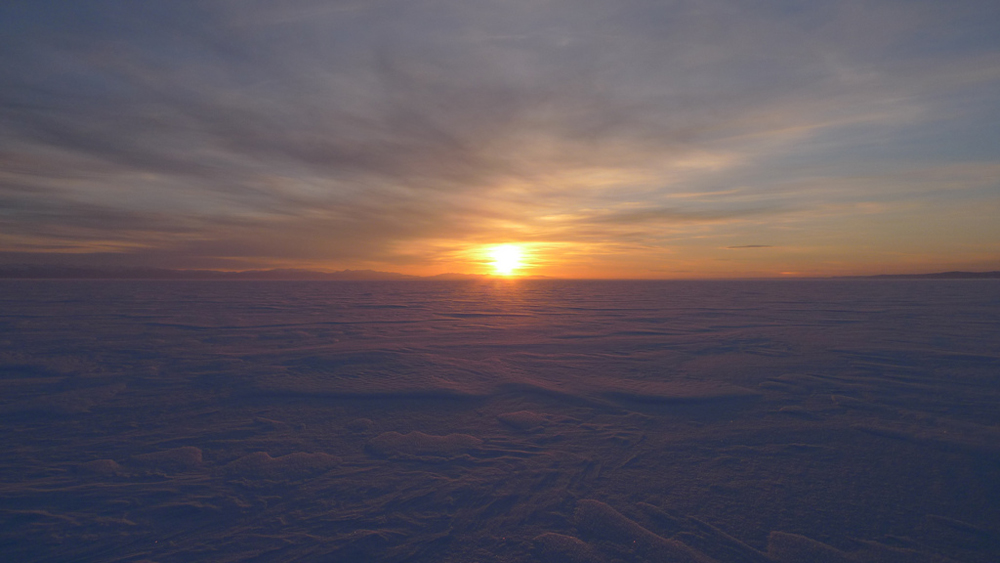Threatened Lake Baikal
"This stuff [green-black sticky algal blooms] stretched far into the distance for several kilometers."
"The beach was in terrible condition."
Yury Azhichakov, 61, Lake Baikal, Russia
"[The lake is] absolutely ill."
"Will we Russians be able to show the world that Baikal can avoid the common fate of so many other lakes?
"That is a question I ask from the bottom of my heart."
Dr. Oleg Timoshkin, biologist, Russian Academy of Science
 |
| General view of Lake Baikal, Russia -- United Nations Environment Programme |
Lake Baikal in Siberia is recognized as the globe's oldest, deepest, most voluminous lake, holding twenty percent of the Earth's unfrozen freshwater. It has long held the reputation of being the world's cleanest lake. No longer. When Mr. Azhichakov fondly approached his favourite beach, Senogda Bay, on the northwestern shore of Lake Baikal, he almost fell off his bicycle with astonishment. Its sands now lay under a thick mat of reeking algal blooms.
These algal blooms are notorious for their ability to produce neurotoxins deleterious to fish and crustaceans, and upward in the food chain, to the humans who eat those fish and crustaceans. The blooms have emerged as a threat to freshwater lakes worldwide. Lake Baikal is a World Heritage site, where over 3,700 species -- more than half of which are to be found nowhere else, live and thrive. Or, they did traditionally when the lake was still pristine; their survival is now threatened.
Eutrophication has taken place, resulting from an excessive growth of algae and other plants in competition for nutrients, fed by runoff from fertilizers and other pollutants. As the blooms gradually starve the water of oxygen, aquatic plants and animals suffocate and the algae blooms proliferate. It was always assumed by Russian biologists that Lake Baikal was protected by its size and depth, from being struck by such an ecological disaster. That was before the growth in tourism and development.
Spirogyra, a specimen of green algae rarely before seen in the shallow zones of Lake Baikal has been recognized in the algal outbreak. There was little difference found by researchers in the presence of phosphorus and nitrogen contact -- identifiers of synthetic detergents and fecal matter -- in treated and untreated water that enters the lake. It also emerged that Russian Railways has been spilling industrial grade waste into the town's sewage system, effectively overwhelming its treatment capacity.
This has led Dr. Timoshkin and his colleagues to insist that an immediate ban on synthetic detergents be instituted. They are asking for assistance from the government of the Russian Federation to reform sewage facilities. In response, some government officials and academics claim that it is not pollution that has caused this deterioration in Lake Baikal, but rather climate change, while others state that scientists' calls for greater funding has used the fiction of eutrophication as a false claim.
 |
| Lake Baikal, the world’s largest lake by volume, is a national treasure
in Russia. The freshwater lake is home to an impressive array of plants
and animals
Photo courtesy onurati via Flickr Creative Commons
|
Lake Baikal's problems with eutrophication represents only one of the threats overtaking the fabled body of water. There are plans by Mongolia to build up to eight hydroelectric dams on the Selenga River and its tributaries, which just happen to be the source of fifty percent of the lake's surface water. The government of Mongolia, while importing 8 percent of its energy from Russia and 12 percent from China, insists the dams would effectively lead to energy independence, reducing coal use that affects climate and the environment.
China, which finds itself in the centre of a dispute between Russia and Mongolia, through its funding of the largest of the projects, has decided to freeze dam construction until such time as an assessment is carried out to more fully understand potential stress on the lake. Despite which, Chinese and Russian tourism companies have announced the investment of $11-billion meant to develop new hotels, tourism attractions and infrastructure in close proximity rimming the lake.
Summer surface waters at Lake Baikal have already warmed about two degrees Celsius since 1977, auguring ongoing and unstoppable 'progress' in exploiting this unique natural wonder which in the final analysis will utterly compromise the very elements that make it so uniquely admirable. To the point, presumably, where matters will continue to fester so that as tourism increases the new hotels will overlook beaches entirely polluted and a once-beautiful lake that has become a fetid death trap for aquatic life.

Lake
Baikal is the world's most voluminous lake—holding about 20 percent of
Earth's liquid freshwater—and a treasure trove of biodiversity and
unique species. However, the lake is in one of the world's most rapidly
warming regions. The lake's temperature has risen dramatically since the
1940s,threatening its fish and other aquatic creatures.
Labels: Climate Change, Environment, Heritage, Nature, Pollution, Russia

0 Comments:
Post a Comment
<< Home